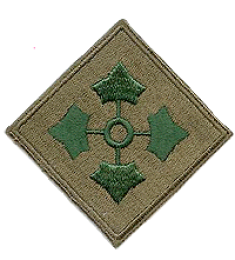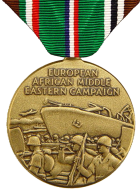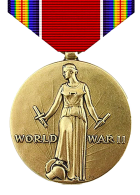John C. Ausland's book was dedicated to Else Ausland, who patiently relived World War II with me. I was born in LaCrosse, Wisconsin on July 14, 1920 and have spent much of my life on the move. My father worked for a railroad, and we lived at various times in Illinois, Minnesota, Missouri, and Texas. In twelve years of schooling, I went to twelve different schools. After the war years in the US Army (more on this later), I spent four years at Princeton University. From there I went into the Foreign Service, which took me to Germany, Yugoslavia, Australia, Norway, and Switzerland
4th Infantry Division Lands in Normandy
Other than rough seas, which increased the normal amount of seasickness, the channel crossing was uneventful. We boarded our Landing Craft Tank (LCT) in the port of Dartmouth, on a bright, sunny day. Lt. Col. Joel F. Thomason (Tommy) and I crossed the channel on the same landing craft as Col. James Van Fleet. He was commander of the 8th Infantry Regiment of the 4th Division, which was the assault regiment on Utah Beach. It was probably no coincidence that Maj. Gen. Raymond O. Barton, commander of the 4th, chose the 8th for this task. He had commanded it earlier (as had General George Marshall in 1933).
After we were out in the channel, a storm came up. General Eisenhower decided to delay the invasion, set for June 5. As a result, we spent an uneasy night near the Isle of Wight. June 6 dawned grey and windy. As we neared the French coast, we found ourselves in the midst of a gigantic armada. Naval guns were firing, and we could see the smoke from the naval and air bombardment of the coast.
We moved to a smaller landing craft for the run into the beach. I thought of the advice my father had given me when we last saw each other. Having seen terrible combat during World War I, he said, “John, you will be in great danger. You must be careful.”
My first letter after the landing was to my father but was undated. When writing it, I was not aware that, as I went ashore in France, he was lying on a stretcher in an aircraft. Seriously ill, he was on his way from China to a hospital in India.
Dear Dad,
Am following your advice as closely as possible and finding it not too unsound. I suppose the first engagement is the hardest, at least I hope so. We ain’t losing and let’s hope we can keep Jerry on the run long enough to convince him he’s licked.
My best love to you, John
Another letter went to my mother about this time. She was living at her family home in Philadelphia. I used the salutation “Dear Folks” to indicate that it could be shared with other family members.
Dear Folks, June 15
As I look back on the past days, it is with difficulty that I recall varying times and events, and it is impossible to tie the two together. Actually, it is more as a void, a nightmare I should prefer to forget. Oh, never fear for me, as my danger is no more or less than any other soldier, but many about me, as is inevitable in war, suffered. This has been one of the few times in my life that I have been able to completely forget myself and think actually of the welfare of others. It seldom occurs to me that it might have just as well been me. Now I can see that it could have been but wasn’t.
Yes, this makes a tale of heroic sacrifice of which Americans may well be proud. A group of men with little in the way of weapons and no protection other than the countryside has completely smashed the so-called West Wall, and don’t think for a moment that it was not tough. If I get the time, in coming days I shall tell you what I can remember and am allowed of what happened. Just this short period could very easily fill a book. The development of the “green” troops into experienced fighting men is a marvel to behold. Poor soldiers became heroes, and some who seemed good proved inadequate.
It is getting dark. Tomorrow brings another day and one day nearer the destruction of the enemy and the freedom of a continent. May they and the American citizens prove worthy of these men’s efforts and sacrifices.
Love, John
Dear Folks, June 16
My lungs feel as though they are getting “fox-hole-itis.” It is nothing at all really. Just the result of sleeping in a damp hole, eating an inadequate diet, and getting inadequate exercise. Do you know with whom I crossed the channel, or at least he was on our craft. It was Larry Lasueur, CBS correspondent. He was a pretty nice fellow and interesting to chat with.
As I moved inland, some interesting things occurred. First of all, I was amazed by the few dead one noticed. There were hundreds of German prisoners on the beach, but few dead. The prisoners were frightened to death, thoroughly shaken up by our air and navy beach drenching. Going inland, our own walking wounded were already coming back.
A German gun was firing on a bridge on the road. Col. Thomason and I stopped and asked a young Frenchman where it was. He said he knew. Would he lead us to it? Yes, he would. Then he took us to within 600 yards, pointed in a direction, and indicated he would go no further. We never did find it. Col. Thomason later told me that a single parachutist happened across the gun, got the drop on them, and took them prisoner.
These parachutists are rugged soldiers. They neither seek nor give quarter. But theirs was a difficult task and they did it efficiently.
Love, John
RECOLLECTION: GUILT FEELINGS
“The 8th Infantry attacked and captured the last strong point in its zone, one of the most heavily armed positions yet encountered.” (Utah Beach to Cherbourg, Historical Division, Department of the Army, 1947, page 183.)
Shortly before reaching Cherbourg, the 8th Regiment ran into a strong point. I suggested to Col. Van Fleet that instead of just using an artillery preparation, he ask the Air Force to have dive bombers attack it. As a result, on June 24 twelve P-47s dropped twenty-four five hundred pound bombs, all but one of which hit the target area.
Nevertheless, the 2nd Battalion attack failed, with heavy casualties. In an after action interview, Lt. Col. Carlton O. MacNeely, the battalion commander, commented that the forward observer stopped the artillery prematurely. As a result, the infantry began its charge too far from the strong point. The Germans simply came out of their dugouts after the bombardment was over and started firing.
Later in the day, with the help of tanks, the battalion captured the strong point and took over sixty prisoners. While some of the guns had been destroyed by the air bombardment, most of them were intact.
Dear Folks, June 25, 1944, Somewhere in France
And here it is, D plus 19. Not many days to the observer, but to me it seems like an eternity - that is, to me and to thousands of others. However, we all have high hopes that this phase of the second front is not too far from termination.
After a time, our warfare seems to settle into a bit more of a routine, but our living, eating, and sleeping habits are far from the best, and one soon finds himself just a little “groggy” and tired. And my task has been comparatively easy, so you may imagine how others feel. I’m usually at least a thousand yards from the front. But it’s those who make the front who really have it tough. We have learned much and no doubt in the future will take advantage of this experience. Let’s hope we have learned our lessons well.
I have received several of your small packages and am looking forward to a big one. You can use this as a request for another package. There’s nothing I particularly need just now, aside from an occasional box of “boodle.” Mail is also one of the biggest lifts we get. We received our first letters about D plus 7, and was it welcome!
A letter from dad. He seems to be having a rough time of it, but I’m quite sure should be all right in no time at all now. At least, that is the way he seemed to feel about it.
My best love to all - John
FINALLY, A Long letter about D-Day
Dear Folks, June 28, 1944, Somewhere in France
Each night we said, “The Luftwaffe is bound to strike tonight.” But it didn’t. The last night our sleep was far from satisfactory. On a rough sea, our LCT tossed about like a bottle. Four of us slept in a space large enough to hold two. We awoke shortly after midnight to hear the C-47s, which had carried the paratroopers, come over. It was a beautiful sound - there must have been a thousand of them.
After an inadequate breakfast of coffee and pancakes, we loaded on an LCM that came alongside the LCT. We then moved over to pick up some personnel from another craft. With the exception of an occasional splash caused by a coastal battery, there was little difference between this and the dozen practice landings I’ve been on.
H-hour passed us while we were still far from shore. We couldn’t even hear the terrific naval and air bombardment we knew was going on. But we knew that right then a death struggle was being waged on the beach, one which had to be won by the infantry, since they were the only ones ashore.
Meanwhile, we cursed for the x'th time the spray that came over the front end of the craft and soaked us to the skin. Capt. Livingston and I pulled a blanket lying in the boat over us to ward the worst of the water off. How unimportant being wet was soon to become!
At last our craft touched the beach. The ramp went down. Automatically we went off the side of the ramp and into the water up to our knees. We walked ashore (one doesn’t run in surf). Aside from rifles and machine guns firing inland, all was quiet. There were surprisingly few dead on the beach. Just back of the sand dunes several hundred German prisoners huddled. Already hundreds of people were organizing the beach for the largest amphibious undertaking in history.
We went about our work of getting the battalion in and into position, a task not without heartache. I saw my first German dead. He must have been killed while running. Even in death his body seemed to be trying to surge forward. His helmet and uniform was all in place. He had been dead several hours. I could tell by the color of his skin. He was wearing glasses, still not broken. I remember self-consciously saying to someone, “Well, he won’t bother anyone again.” Now I wonder whether he ever wanted to bother anyone.
Moving up the road, I came across an American soldier lying beside the road. He was wounded in one arm. With the other he was trying to hold a match box and strike a match. I leaned over and struck the match, lit the cigarette. He was hit pretty bad. Neither of us spoke a word. What could one say. I moved on.
The rest of the day was a whirl of movement and activity. At last we got our unit off the bomb torn beach and away from constant shelling. For the rest of the day there are only momentary recollections:
Tough paratroopers wandering about, killing German snipers. The medics who dropped, unarmed, with the paratroopers, shortly after midnight. The sniper (we later learned he was 75 yards from our command post) who shot at us all day without hitting anyone. He was killed by a paratrooper who happened across him. The French people in a small village ignoring the bodies about them and waving to us as we went by. This same village was held for twelve hours by four paratroopers.
That first night when all the men were nervous (trigger-happy) and shot at anything that moved. The dumbfounded glider pilot who had 200 Germans surrender to him, who asked me what in the h*** he should do with them. The thrill of watching the multitude of gliders come in and the multicolored supply parachute drops. And the dull thud of your heart when you watched the wounded and dead carried out of those gliders that crashed. These and a hundred other events made up D-day for me.
Love, John
Story provided by Irving Smolens.






